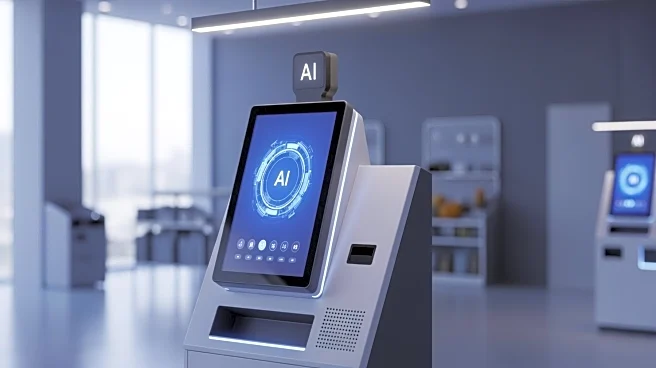What's Happening?
The self-checkout system market is experiencing significant growth, driven by advancements in retail automation and AI technologies. According to a report by The Insight Partners, the market is expected to grow at a compound annual growth rate (CAGR)
of 8.2% from 2025 to 2031. This growth is fueled by increasing consumer demand for contactless shopping experiences and the integration of digital payment solutions. Self-checkout systems offer retailers a way to manage labor shortages and improve operational efficiency, while providing consumers with faster and more convenient shopping options. The report highlights the importance of self-service technologies in modern retail environments, as they enhance customer experience and streamline operations.
Why It's Important?
The expansion of self-checkout systems reflects a broader trend towards automation in the retail industry, which is reshaping how consumers interact with stores. This shift is crucial for retailers looking to optimize costs and improve customer satisfaction. As consumers increasingly prefer contactless and cashless transactions, self-checkout systems support these preferences, aligning with omnichannel retail strategies. The adoption of AI and IoT technologies in self-checkout systems enhances data analytics capabilities, allowing retailers to better understand consumer behavior and improve inventory management. This technological evolution is likely to drive further innovation in retail, impacting how businesses operate and compete.
What's Next?
The future of the self-checkout system market will likely see the integration of AI-powered solutions, such as visual recognition and machine learning tools, to improve transaction accuracy and reduce shrinkage. Retailers may also introduce fully automated, cashless stores, leveraging apps and facial recognition systems for seamless transactions. As the market evolves, there will be a focus on sustainable and energy-efficient kiosk designs, aligning with global sustainability goals. The expansion of smart retail ecosystems in emerging markets, particularly in Asia Pacific and Latin America, will further drive growth and adoption of self-checkout technologies.
Beyond the Headlines
The rise of self-checkout systems may lead to ethical considerations regarding data privacy and consumer protection. As retailers collect more data through these systems, ensuring compliance with regulations and safeguarding consumer information will be paramount. Additionally, the shift towards automation raises questions about the future of retail employment and the need for workforce retraining. The integration of voice and gesture control technologies in self-checkout systems could also enhance accessibility, providing more inclusive shopping experiences for diverse consumer groups.















